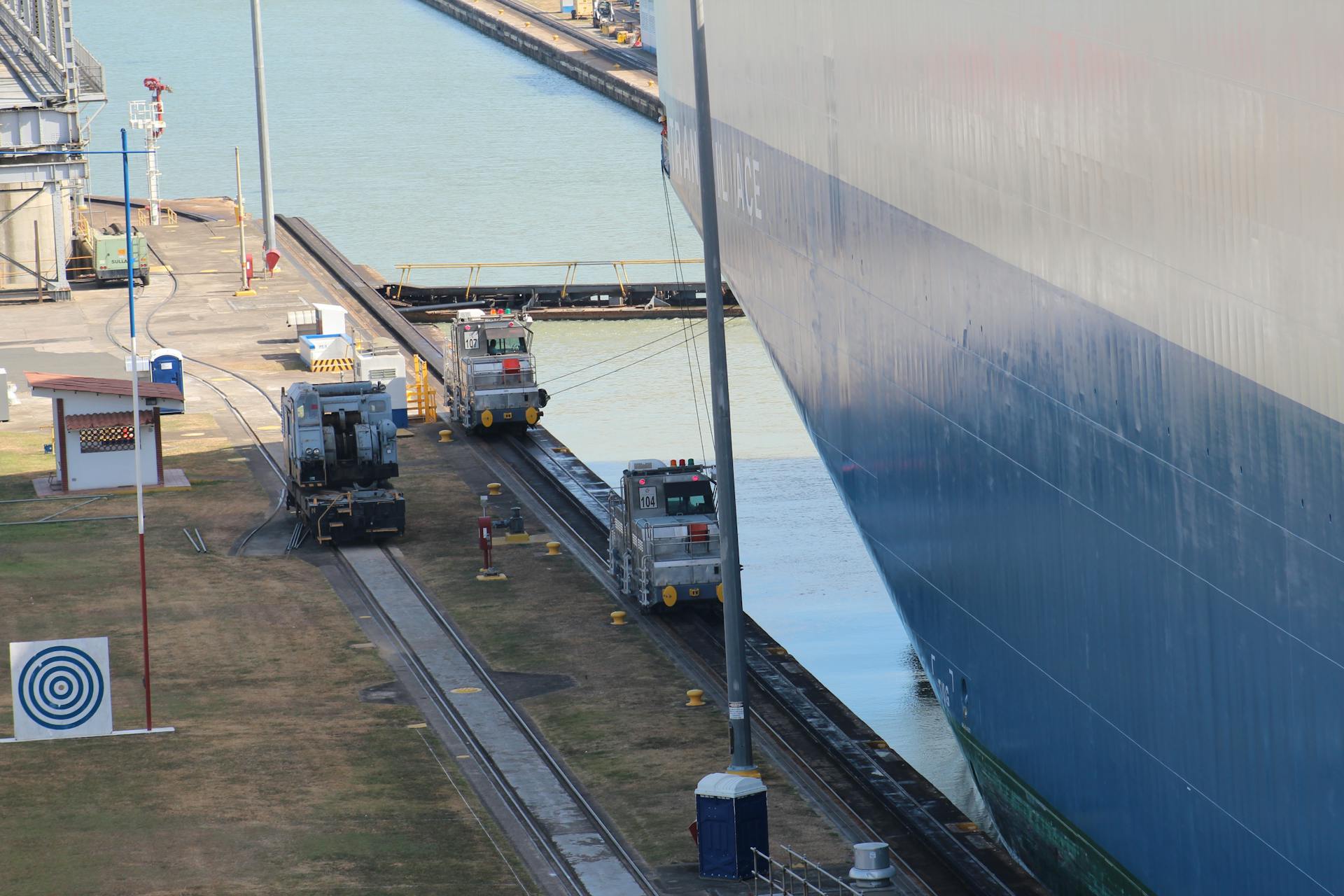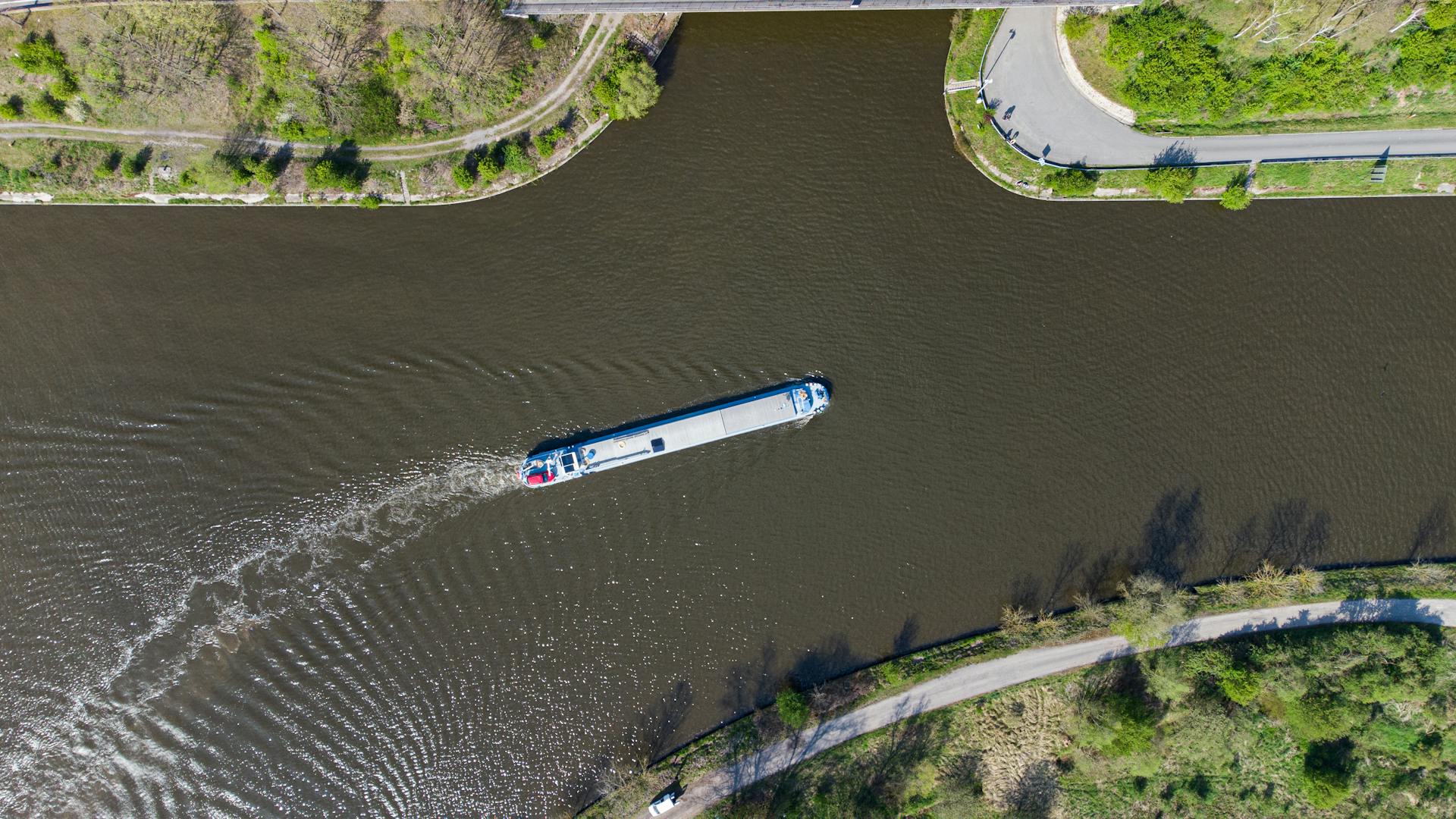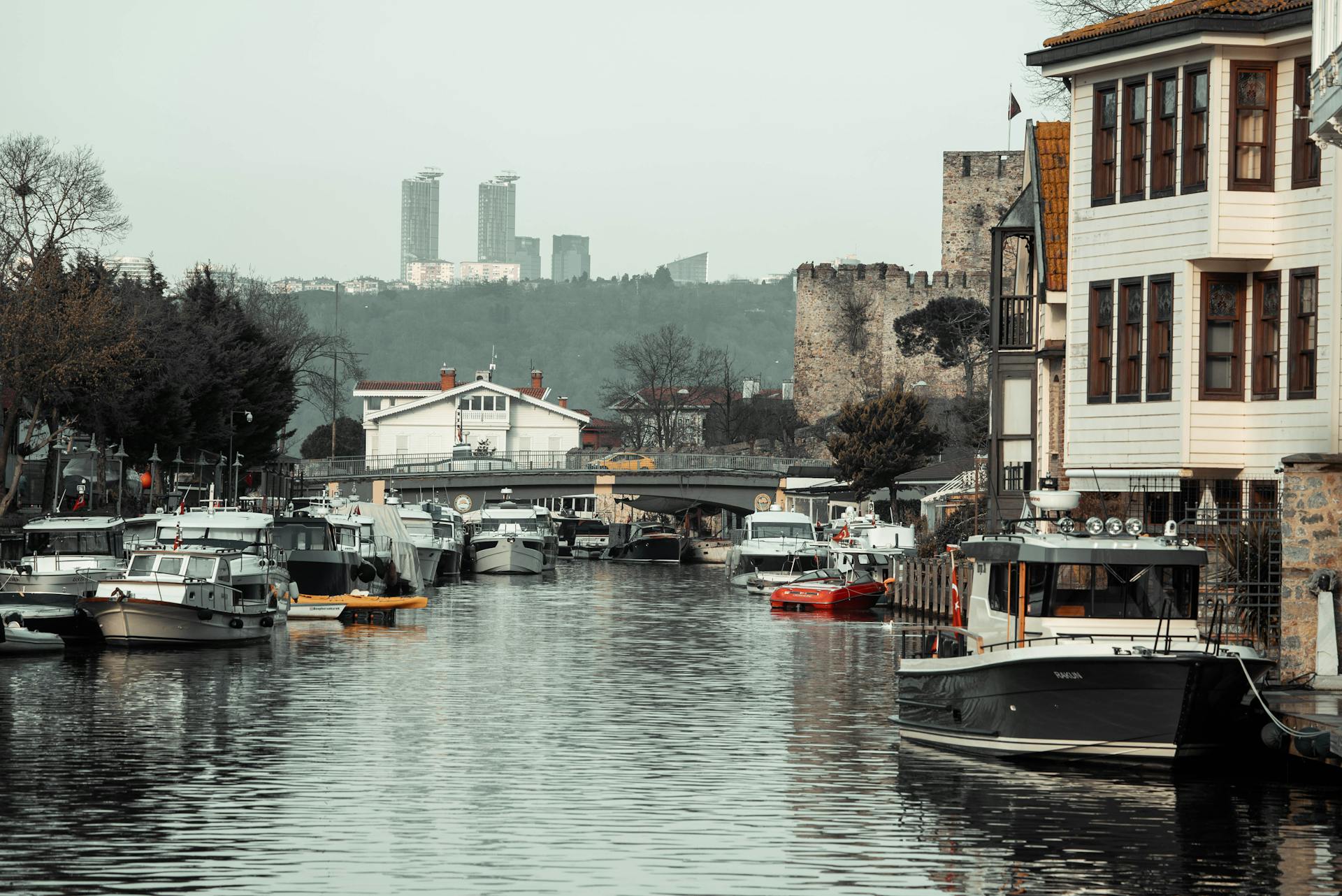
The Turkey Canal Istanbul project has been surrounded by controversy since its inception. The project's estimated cost is around $15 billion, which has raised concerns about the project's feasibility and potential financial burden on the Turkish government.
The proposed canal is expected to be approximately 45 kilometers long, connecting the Black Sea to the Sea of Marmara. This would significantly reduce the distance and travel time for ships passing through the Bosphorus Strait.
Environmental concerns have been a major point of contention, with some experts warning that the canal could damage the ecosystem and harm marine life. The project's impact on local communities and wildlife has been a topic of heated debate.
The Turkish government has touted the project as a game-changer for the country's economy, but critics argue that the benefits may not outweigh the costs.
Project Overview
The Kanal İstanbul project was first mentioned by Minister of Transport Binali Yıldırım in May 2009 at the parliament. It was initially planned to be in service by 2023, the 100th anniversary of the foundation of the Republic. The project was dubbed the "Crazy Project" (Turkish: Çılgın Proje) after a phone call between Prime Minister Erdogan and columnist Hıncal Uluç.
The project's research studies were completed within two years, and the first stage of the project commenced in April 2013, which includes the construction of various network bridges and highways. The construction work is scheduled to begin in mid-2021 and is expected to take seven years to complete.
The project's value may reach 25 billion US dollars, including 10 billion dollars for building areas on both sides of the canal and 15 billion dollars for the cost of building the canal, with a completion date of 2027.
Worth a look: Istanbul S Gokcen Turkey
What Is Istanbul?
Istanbul is a city with a rich history and a strategic location, making it a crucial hub for trade and commerce. It's situated on the Bosphorus Strait, which connects the Black Sea to the Mediterranean Sea.
The city is home to a massive canal project, the Istanbul Kanal, which aims to reduce the pressure of navigation in the Bosphorus Strait. The project has been in the works since 2011, when it was first announced by President Recep Tayyip Erdogan.
The Istanbul Kanal project is expected to bring significant economic and commercial gains to the state. The project's vision for 2023 and 2053 outlines the many benefits it will provide, including reducing the pressure of navigation in the Bosphorus Strait.
Curious to learn more? Check out: Bosphorus Istanbul Turkey
Project Overview
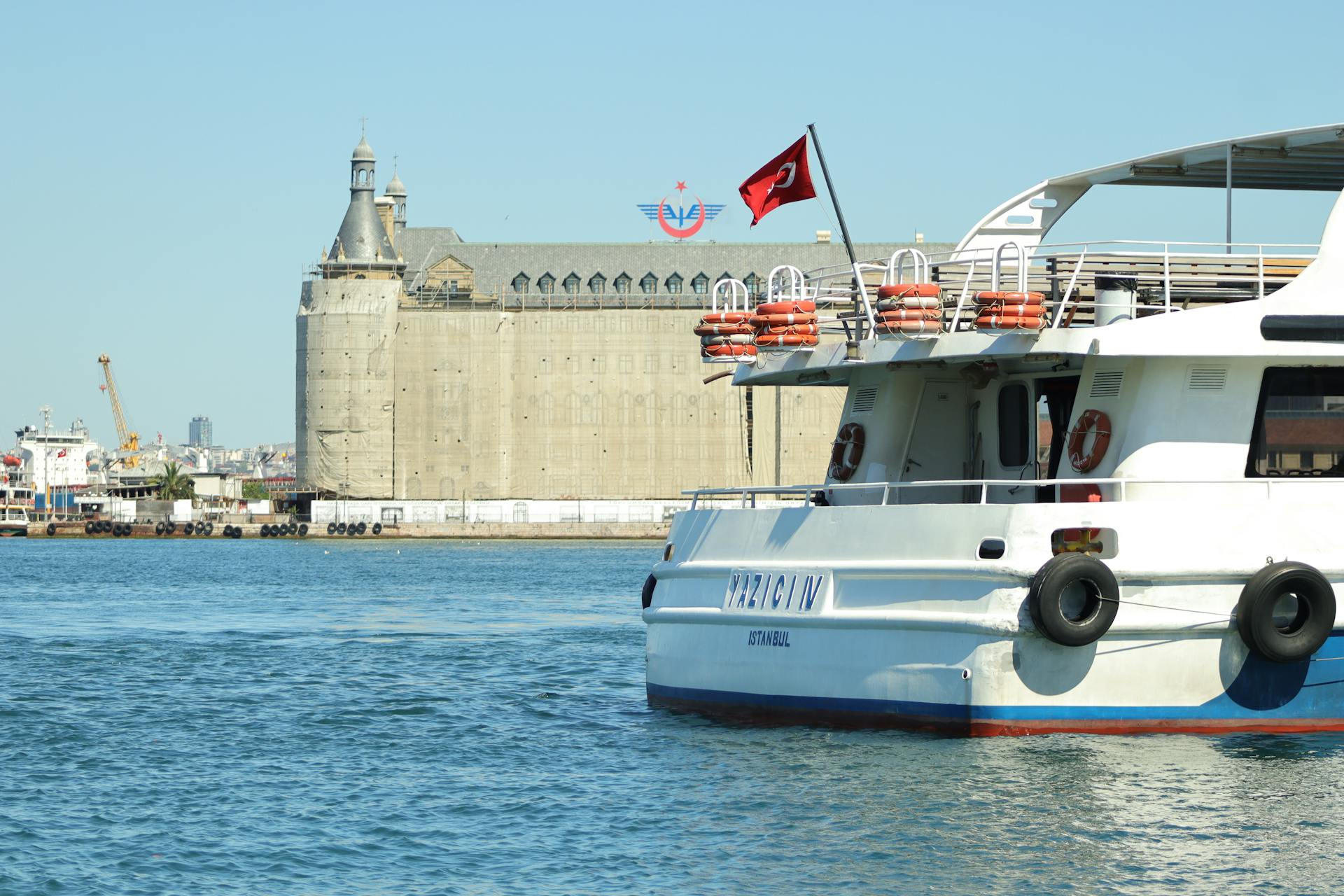
The Kanal İstanbul project was first mentioned in a 2010 article by Hıncal Uluç, a columnist with the daily Sabah, who referred to it as the "Crazy Project" after a phone call with Prime Minister Erdogan.
The project was initially planned to be completed by 2023, the 100th anniversary of the foundation of the Republic, but construction had not yet commenced by December 2019.
The project involves constructing a 45 km long canal that will link the Sea of Marmara and the Black Sea, with a width ranging from 400 to 1000 meters and a depth of up to 25 m.
The canal is expected to provide passage for 160 ships or tankers annually and relieve pressure on the Bosphorus Strait, which is one of the busiest straits in the world.
The Turkish Government announced that research studies about the canal would commence in May 2013, and the first stage of the project, which includes the construction of various network bridges and highways, commenced in April 2013.
For more insights, see: Turkey Istanbul Sea
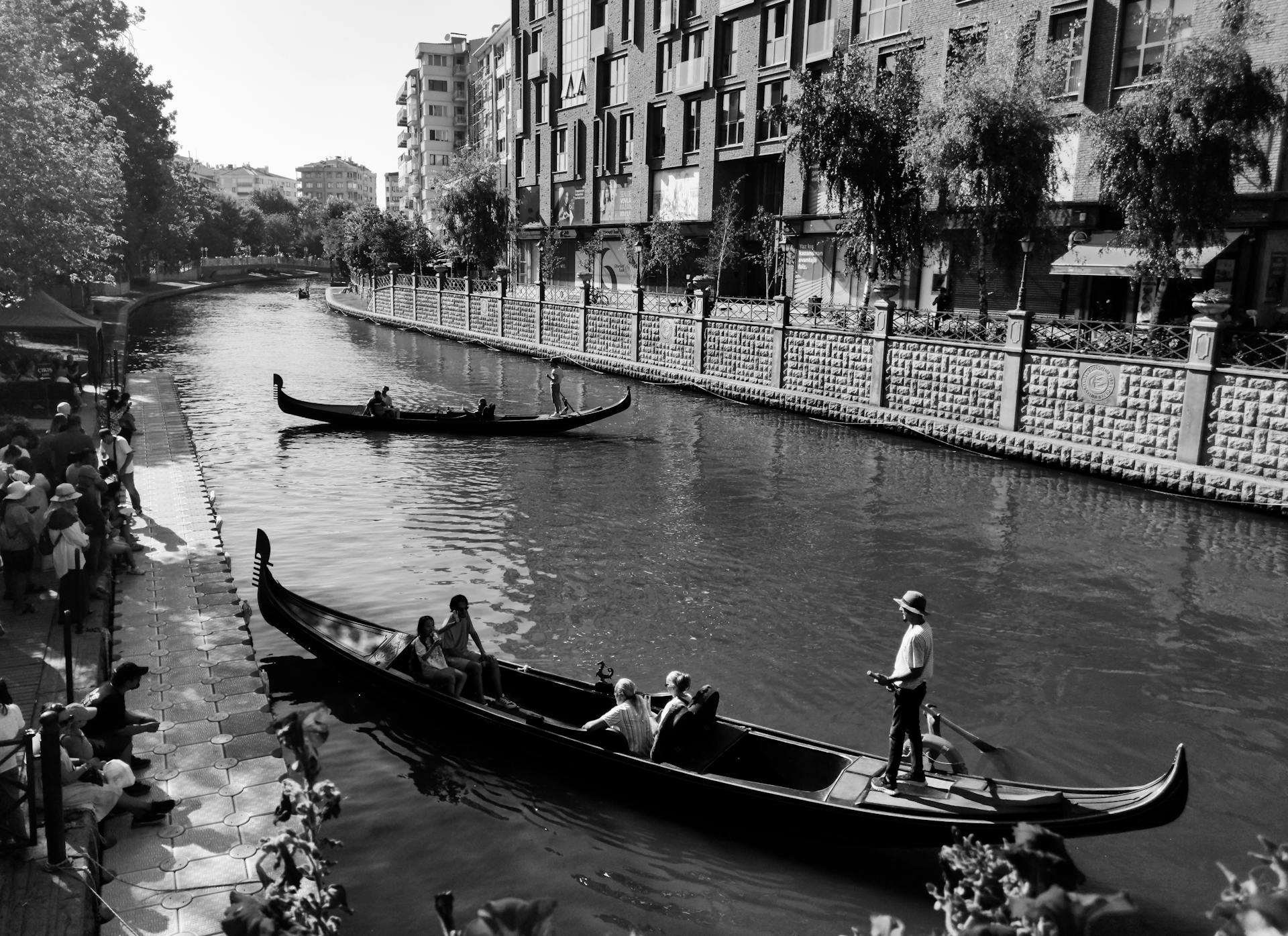
Construction work is scheduled to begin in mid-2021 and is expected to take seven years to complete.
The project is expected to generate significant profits for Turkey, with estimates suggesting it will bring in up to 8 billion dollars annually.
The new canal will provide traffic without referring to the Montreux Convention, which is a major advantage for Turkey.
The project was presented again through Turkey's vision for 2023 and 2053, highlighting the number of benefits accruing to the state in terms of economic and commercial gains.
Cost
The estimated cost of the Istanbul Canal project is a staggering ₺75 billion, equivalent to around US$10 billion. This massive investment will create a significant number of jobs, with 8,000-10,000 people expected to be employed during the construction phase.
The central government has proposed a build-operate-transfer model for the project, but will use funds from the national budget if needed. This flexibility in funding will help ensure the project's success.
A more recent estimate puts the total cost of the project at around 25 billion US dollars, broken down into 10 billion dollars for building areas on both sides of the canal and 15 billion dollars for the cost of building the canal.
Environmental and Strategic Impact
The environmental and strategic impact of the Turkey Canal Istanbul project is a pressing concern. The first 16.2 km of the canal will pass through weak alluvial soil prone to liquefaction, creating a risky situation in terms of earthquake effects.
The risk of destruction of the water resources of the Terkos Dam and the Sazlıdere Dam and salinization of groundwaters was not thoroughly examined. This is a critical issue, as these dams provide essential water supply for the region.
The project has been criticized for its lack of detail on how to dispose of the 53 million m of bottom sludge to be dredged from Lake Küçükçekmece. This is a major environmental concern, as improper disposal can have devastating effects on local ecosystems.
The Marmara Sea will undergo serious chemical changes such as decreased salinity and increased nitrogen load. This can have far-reaching consequences for the delicate balance of the marine ecosystem.
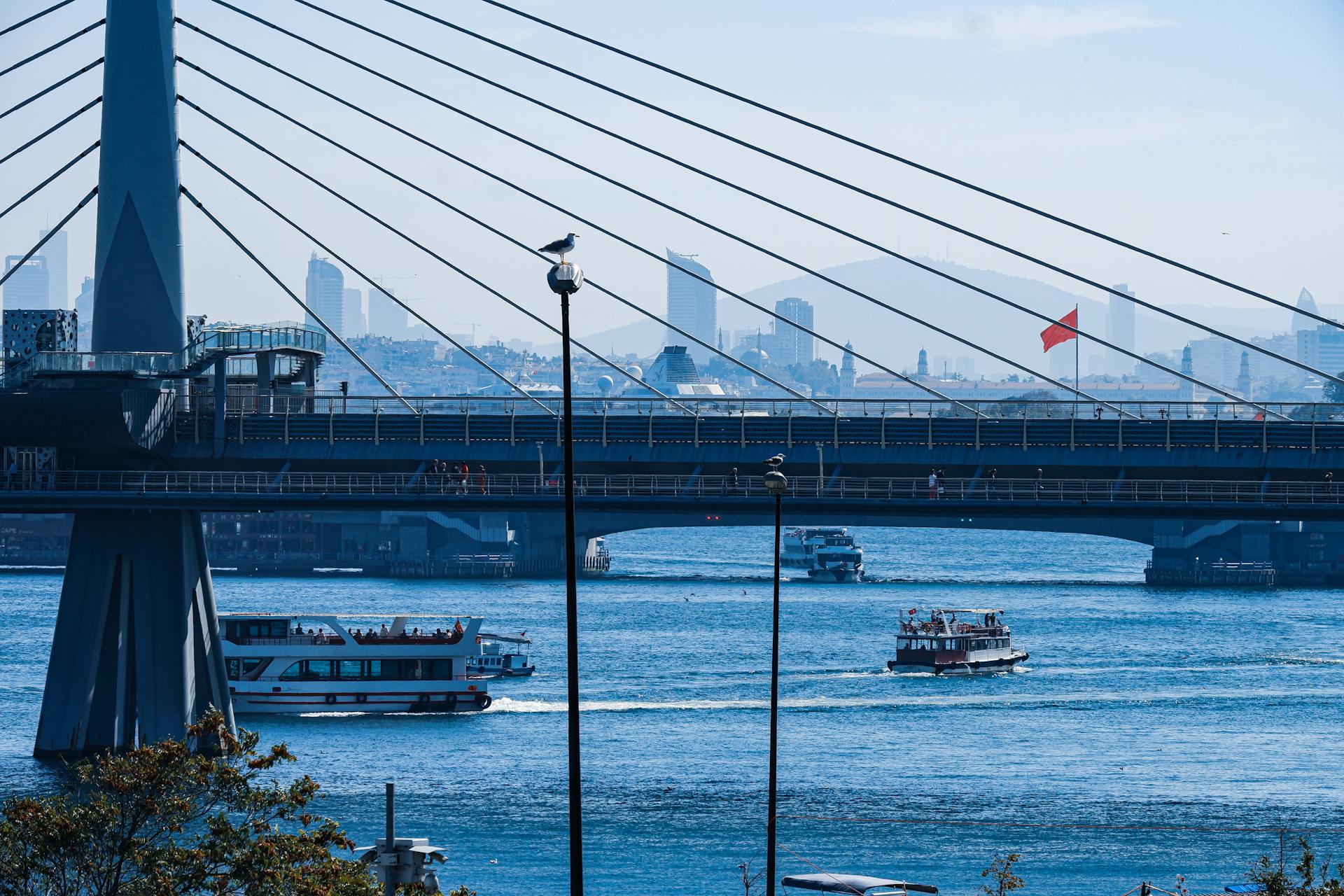
The loss of flora and fauna in the region after the excavation of the canal is a significant concern. The project's impact on the region's biodiversity has not been thoroughly assessed.
The Black Sea is 50 cm higher than the Marmara and less salty. This difference in salinity levels could have unintended consequences for the ecosystems of both seas.
The top 25m of the Marmara would become less salty due to the canal's flow, potentially disrupting the local marine life. This could have long-term effects on the Marmara's ecosystem.
Here are some of the key environmental concerns associated with the Turkey Canal Istanbul project:
- The risk of destruction of the water resources of the Terkos Dam and the Sazlıdere Dam and salinization of groundwaters.
- The lack of detail on how to dispose of the 53 million m of bottom sludge to be dredged from Lake Küçükçekmece.
- The potential for serious chemical changes in the Marmara Sea, including decreased salinity and increased nitrogen load.
- The loss of flora and fauna in the region after the excavation of the canal.
- The potential for the top 25m of the Marmara to become less salty, disrupting the local marine life.
A Divisive Megaproject
The Turkey Canal Istanbul project has been a topic of much debate and controversy.
The project's estimated cost is around $15 billion, which is a staggering amount that has raised many eyebrows.
The proposed canal would be approximately 45 kilometers long, stretching from the Black Sea to the Sea of Marmara.
Many experts have questioned the project's feasibility, citing concerns about its environmental impact and the potential disruption to the city's ecosystem.
The project's supporters argue that it would significantly reduce shipping times and costs for goods transported between the Black Sea and the Mediterranean.
The canal would also provide a new route for oil tankers and other large vessels, potentially increasing Turkey's economic influence.
Strategic and Geo-Political Significance
The Turkish Straits, connecting the Black Sea to the Mediterranean, are among the most critical maritime chokepoints worldwide. They carry significant geo-economic and geo-strategic importance, with 90 percent of world trade being carried out via the sea.
Blocking the Turkish Straits, even temporarily, could lead to substantial spikes in the costs of traded goods due to increased distances, sailing periods, and shipping costs. This would impact exporting and importing economies alike.
The Turkish Straits are home to natural maritime traffic congestion, with 4 percent of global maritime oil passing through their waters. They are also a critical chokepoint for the maritime transit of oil, according to a 2017 US Energy Information Administration report.
One fifth of global wheat exports and one sixth of global maize exports pass through the Turkish Straits, making them the world's most significant transit point for grains. This includes 77 percent of wheat exports from Russia, Ukraine, and Kazakhstan.
The Turkish Straits are considered a highly critical waterway not only because of the volume of trade that passes through them each year, but also because no alternative maritime routes exist.
Prospects and Challenges
The prospects for the Turkey Canal Istanbul project are uncertain, with a recent survey revealing that 49% of the population opposes the project.
A significant challenge is the lack of strong public backing, unlike previous mega-projects. The governing party is also facing weakening domestic support.
Erdogan's determination to carry out the project despite this opposition is driven by a desire to enhance Turkey's geopolitical leverage and personal prestige.
He aims to one-up Ottoman Sultans and challenge the legacy of Mustafa Kemal Ataturk by building a new canal under full Turkish sovereignty. This would undermine Russia's influence and potentially advance US and British interests.
For the EU, the project represents a strategic dilemma, with the potential to deal a blow to Russian influence but also risk a more assertive and autonomous Turkey that doesn't consider European interests.
Frequently Asked Questions
Is the Istanbul Canal being built?
Yes, the Istanbul Canal project is underway, with construction scheduled to begin in mid-2021 and expected to take seven years to complete.
Is Bosphorus a canal?
The Bosphorus is not a traditional canal, but rather a natural strait connecting the Black Sea to the Mediterranean Sea. It's officially known as the İstanbul Boğazı in Turkish, which translates to "the Strait of Istanbul
How much money does Turkey make from Bosphorus?
Turkey's profit from ships passing through the Bosphorus Strait is approximately $185 million, a significant increase from $35 million two years prior. This substantial growth highlights the strategic importance of the Bosphorus in international trade.
Sources
- https://en.wikipedia.org/wiki/Istanbul_Canal
- https://www.mei.edu/publications/canal-istanbul-dont-believe-hype
- https://www.deal-tr.com/en/blog/istanbul-canal-all-details-and-information
- https://www.aljazeera.com/news/2021/4/5/turkey-what-you-need-to-know-on-canal-istanbul-montreux-dispute
- https://www.swp-berlin.org/10.18449/2021C43/
Featured Images: pexels.com

